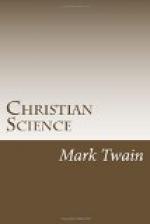APPENDIX E
Reverend Heber Newton on Christian Science:
To begin, then, at the beginning, Christian Science accepts the work of healing sickness as an integral part of the discipleship of Jesus Christ. In Christ it finds, what the Church has always recognized, theoretically, though it has practically ignored the fact—the Great Physician. That Christ healed the sick, we none of us question. It stands plainly upon the record. This ministry of healing was too large a part of His work to be left out from any picture of that life. Such service was not an incident of His career—it was an essential element of that career. It was an integral factor in His mission. The Evangelists leave us no possibility of confusion on this point. Co-equal with his work of instruction and inspiration was His work of healing.
The records make it equally clear that the Master laid His charge upon His disciples to do as He had done. “When He had called unto Him His twelve disciples, He gave them power over unclean spirits, to cast them out, and to heal all manner of sickness and all manner of disease.” In sending them forth, “He commanded them, saying, . . . As ye go, preach, saying, The kingdom of heaven is at hand. Heal the sick, cleanse the lepers, raise the dead, cast out demons.”
That the twelve disciples undertook to do the Master’s work of healing, and that they, in their measure, succeeded, seems beyond question. They found in themselves the same power that the Master found in Himself, and they used it as He had used His power. The record of The Acts of the Apostles, if at all trustworthy history, shows that they, too, healed the sick.
Beyond the circle of the original twelve, it is equally clear that the early disciples believed themselves charged with the same mission, and that they sought to fulfil it. The records of the early Church make it indisputable that powers of healing were recognized as among the gifts of the Spirit. St. Paul’s letters render it certain that these gifts were not a privilege of the original twelve, merely, but that they were the heritage into which all the disciples entered.
Beyond the era of the primitive Church, through several generations, the early Christians felt themselves called to the same ministry of healing, and enabled with the same secret of power. Through wellnigh three centuries, the gifts of healing appear to have been, more or less, recognized and exercised in the Church. Through those generations, however, there was a gradual disuse of this power, following upon a failing recognition of its possession. That which was originally the rule became the exception. By degrees, the sense of authority and power to heal passed out from the consciousness of the Church. It ceased to be a sign of the indwelling Spirit. For fifteen centuries, the recognition of this authority




